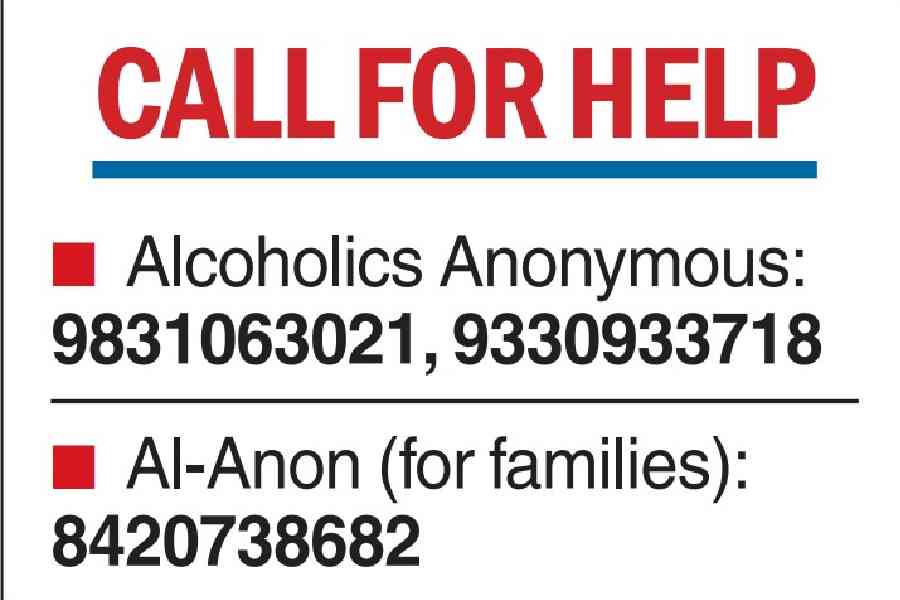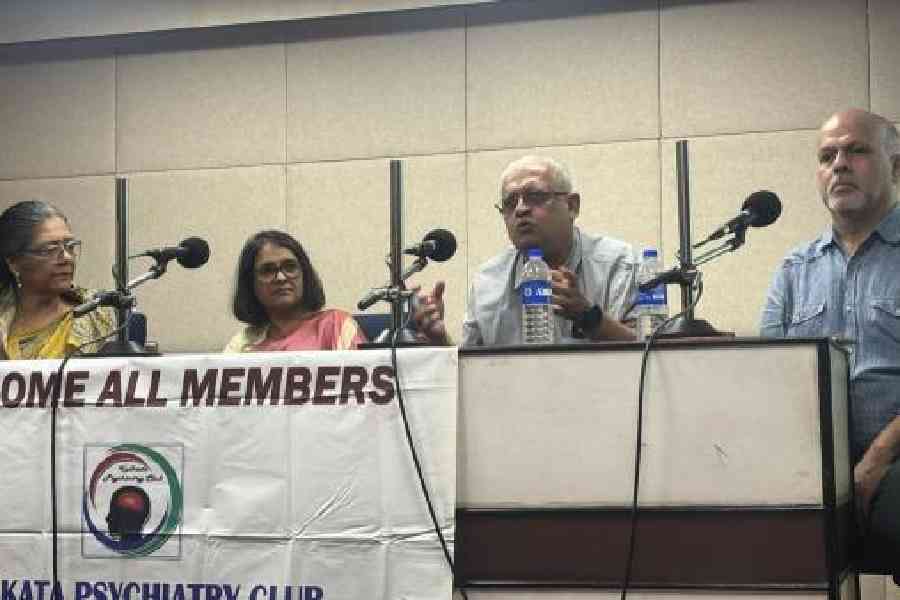Alcohol is not always the culprit; rather, a person’s “underlying vulnerabilities” often make them more susceptible to using alcohol to cope with difficulties, psychiatrists said at a public awareness session aimed at understanding alcoholism.
“It’s not the bottle that is the real culprit, but the circumstances that make alcohol a way for people to deal with certain difficulties,” said Vivek Benegal, former head of the Centre for Addiction and the department of psychiatry at NIMHANS, Bangalore.
The Kolkata Psychiatry Club organised the August 24 programme to address alcoholism, a condition often misunderstood and stigmatised by society and even families, who sometimes label alcoholics as “insane” instead of recognising their need for treatment and support.

Symptom, not problem
Psychiatrist Benegal explained that alcoholism is not the root problem but the outcome of “inner vulnerabilities” or “difficulties in psychological abilities”. These are the skills people use to interact with the world and manage daily challenges.
“We often wrongly assume that removing alcohol will fix everything. The bottle is just a symptom. Many who develop alcohol problems have struggled since childhood with psychological abilities needed to cope with life’s demands,” he said.
Kolkata Psychiatry Club convener psychiatrist Jai Ranjan Ram — who moderated the session — added: “Long-lasting vulnerabilities often missed in adolescence or childhood can lead to dependence on mood-altering substances.”
Risk factors
Some individuals, despite being competent and creative, struggle to handle environmental challenges. “These at-risk youths are prone to alcoholism, drug abuse, risky behaviours like violence and self-harm, and personal relationship issues. Despite their superior intelligence and creativity, they are unable to reach their potential,” Benegal said.
He noted that some people have a diminished response to natural rewards like food and sex, making heightened rewards from alcohol, drugs, or risk-taking more appealing.
Benegal described addiction as a “loss of control,” which applies not only to alcohol but also to tobacco, drugs, social media, online shopping, and gambling.
Help & treatment
A key message of the programme was that alcoholism is a disease with effective treatments.
Getting rid of the bottle or locking someone in rehab is not treatment. “This is a misunderstood condition, and we had this session to help people understand that help is available,” said Ram.
Psychiatrist Benegal emphasised the need to address underlying vulnerabilities.
“There are an increasing number of treatments. Sometimes, one has to deal with mood swings or attentional problems that drive the drinking. If you treat those, it becomes much easier — and the treatment of alcoholism becomes that much more effective,” he said.
Women & alcoholism
Among those who addressed the audience was Lillee B., a 66-year-old woman who has been sober for the past 26 years after battling alcoholism. Her story began with a mug of beer in college.
“I was out of sorts with the world, and when I had it for the first time, I didn’t even like the taste but I loved the effect. It smoothened out the rough edges,” she said.
She couldn’t pinpoint when she crossed the line from heavy drinking to full-blown alcoholism. “I would drink in the morning, hide bottles, have two pegs at a party, and come home to finish what was left in mine.”
Eventually, it began to interfere with her life. She vowed to quit — but relapsed within a week.
“I thought I was unique in my struggle. But when I reached out to a global support community with a chapter in Calcutta, I realised the stories of others were just like mine,” she said.
The two-hour session at Bangla Academy sought to highlight how deeply rooted stigma prevents women from seeking help. That silence often pushes them past the point of return.
“The stigma leads to potential female alcoholics going beyond recall because they don’t seek help,” said Lillee.
Psychiatrist Ram added: “Society doesn’t accept alcoholism as a disease. It sees it as a character flaw — and women alcoholics are even more marginalised and stigmatised.”
Family challenges
Sarmistha from Al-Anon, a global fellowship supporting families of alcoholics, spoke about the challenges families face. Families often struggle to understand alcoholism, mistaking it for just “heavy drinking,” she said.
“In the beginning, the family tries to control the drinking — by pouring alcohol down the drain or hiding bottles. But over time, they realise they can’t fix it,” she said.
Al-Anon shifts the focus from the alcoholic to the family, who are often emotionally and even physically affected by the addiction.
“The family suffers too — but they can still lead a happy life. That’s what our meetings are about. People share their experiences and, simply by listening to each other, they begin to identify with the problems, draw mental strength, and unburden themselves,” Sarmistha added.










